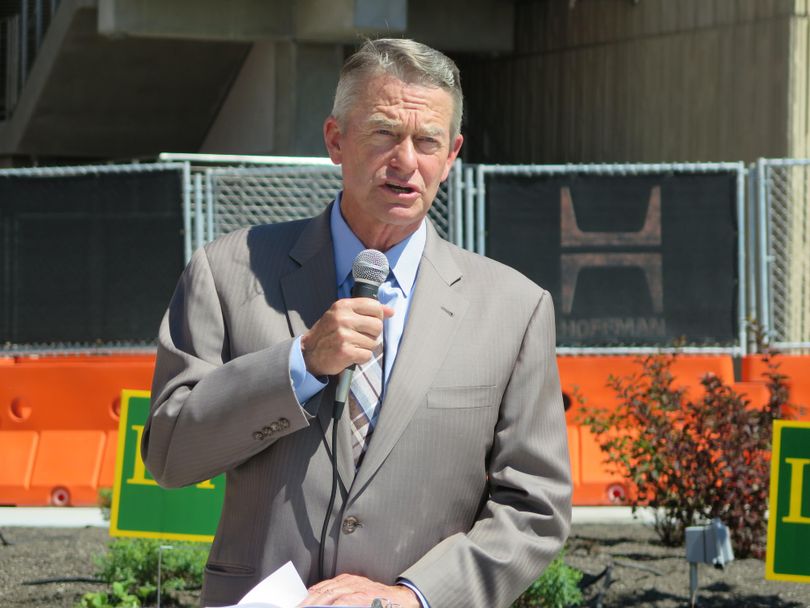Little says if he’s elected governor, Idaho ‘will act’ on health care

Here's my full story from spokesman.com:
By Betsy Z. Russell
BOISE – Idaho Lt. Gov. Brad Little unveiled a series of proposals on health care, the economy and regulation on Wednesday, saying they’re things he’d enact if elected governor in 2018.
Little is in a contested race for the open seat Gov. Butch Otter will leave when he retires after next year; other big-name Republicans already in the race are GOP Congressman Raul Labrador and Boise developer and physician Tommy Ahlquist; no big-name Democrat has yet announced.
“My goal is that future generations will not see their kids leave,” Little said. “We need to create a new generation of qualified and well-educated young people who are ready to compete in the workforce, to make Idaho stronger in the coming decades.”
On health care, he called for a series of specific steps aimed at lowering health care costs for Idahoans. “Once Congress acts, or does not, under my leadership Idaho will act,” he declared. Those steps include:
- Reactivating the state’s high-risk pool, which ended under the Affordable Care Act; it offered a coverage option for people with pre-existing health conditions who couldn’t get insurance.
- Maintaining and enhancing Idaho’s state insurance exchange, Your Health Idaho, “without federal interference.”
- New incentives to expand the use of health savings accounts for individuals and families, both through the exchange and for those with employer-provided health coverage.
- Offering lower-cost, lower-benefit plans not now allowed under the ACA.
Idaho’s state insurance exchange is one of the most successful in the nation, Little said, and it’s maintained competition, with multiple insurers offering plans in every Idaho county. “I think we can be proud that we have as much competition in Idaho as in any state,” he said.
Asked if Idaho could maintain that without the federal Affordable Care Act – which currently offers big subsidies to help many using the exchange pay their premiums – Little said, “We’ve got to know what the rules are. Right now, they’re negotiating back there.”
But he noted, “As we well know here in Idaho, we didn’t take the federal exchange. We’ve always been a place where we try to address our health problems ourselves. We don’t look for federal solutions. If they tell us what the rules are, we’ll continue to modify that. We have one of the most affordable health care exchanges.”
Little also said he’d take a series of steps to “keep our children in Idaho,” from using technology to expand offerings in rural schools to partnering with key Idaho industries that need talent. In addition, he proposed a “first-time home buyer savings account,” similar to a health saving account, in which young families could save up tax-free to make a down payment on a home.
“The young people, they need that incentive to build a nest egg,” he said. “Part of the problem is they’re saddled with debt.” The proposal would let those families save for a home tax-free.
On regulations, Little said he’d require all state agencies to include a “business and competitiveness impact statement” with any proposed new regulation, similar to the fiscal impact statement that lawmakers must include with proposed new laws.
He also called for launching a review of every existing regulation in Idaho’s administrative code; and requiring state agencies to simplify or eliminate an existing regulation before proposing a new one, or “state clearly” why they can’t. And Little said he wants to follow up his earlier executive order requiring a review to justify all current state licensing requirements with legislation to require cost-benefit analyses and other justifications before any new government entity is created.
Labrador’s campaign didn’t respond to a request for comment, and his campaign website offers no policy proposals. Ahlquist earlier posted his own “Blueprint for an Even Better Idaho” on his campaign website.
David Johnston, Ahlquist’s campaign manager, issued this statement: “Tommy has been outlining his conservative blueprint to build an even better Idaho for months and welcomes the lieutenant governor to the conversation with his plan. Tommy is a doer not a talker who has created thousands of jobs in the real world while also investing over $300 million in Idaho. We look forward to continuing to share with all Idahoans Tommy’s real world record as a job creator and his concrete plans for creating more jobs and improving Idaho’s economy.”
Little said Wednesday’s announcement was the first of three parts; the next two, in the coming weeks, will focus on taxes and education.
Asked why he unveiled the proposals now, Little said, “We’re 10 months out from an election, and people need to know what policies the candidates will support.”
Idaho’s GOP primary in 2018 will be on May 15; the general election will follow on Nov. 6.
